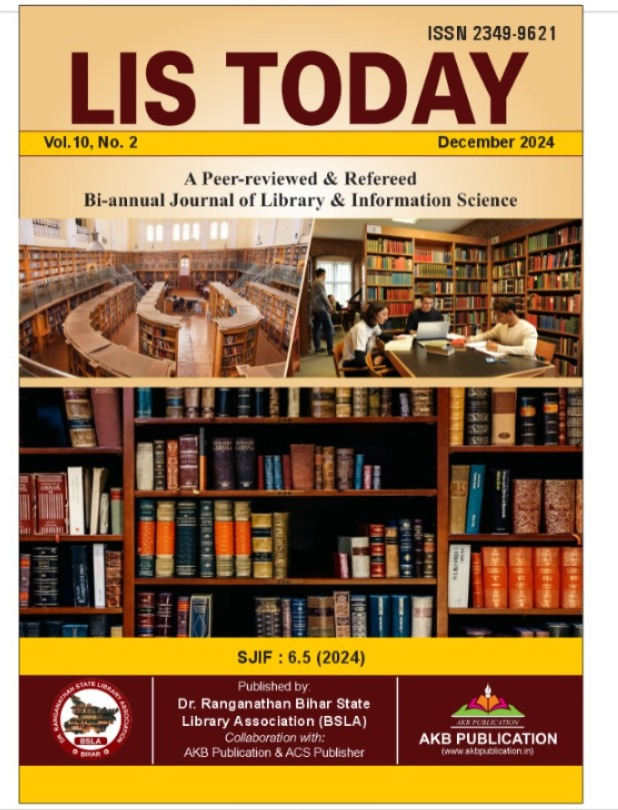The Impact of Internet on the Reading Habits of Undergraduate Students of Government Hamidia Arts and Commerce College, Bhopal: A Survey
DOI:
https://doi.org/10.48165/lstoday.2022.8.12.11Keywords:
Reading Habit, Internet age, Information Technology, Online resources, Reading Behavior, UG studentsAbstract
Reading is a way to get better knowledge of one's own experiences and it can be an exciting journey to self-discovery. The purpose of this study is to try to understand the reading habits of undergraduate students of Government Hamidia Arts and Commerce College, Bhopal and to study the effects of internet on their reading habits. The total number of students participating in the survey is 150, and the questionnaire was distributed to them after random sampling. The results reveal whether students enjoy reading, their frequency of reading books, what genre they prefer to read, the factors that influence their reading habits, and impact of the internet (ICT) media on their reading habits.
References
∙ Loan, F. A. (2011). Impact of Internet on reading habits of the net generation college students. International Journal of Digital Library Services, 1(2), 43-48. ∙ Busayo, I. O. (2011) The school library as a foundational step To children‟s‟ effective reading habits Library Philosophy and Practice . Available @
http://www.webpages.uidaho.edu/~mbolin/busayo-reading.htm
∙ Mokhtari, K., Reichard, C. A., & Gardner, A. (2009). The impact of internet and television use on the reading habits and practices of college students. Journal of Adolescent & Adult Literacy, 52(7), 609-619.
∙ Özparlak, Ç. S. (2022). Digital literacy and views of the COVID-19 pandemic of students who prepared for musical aptitude tests during the pandemic. International Journal of Education and Literacy Studies, 10(1), 26–35. https://
doi.org/10.7575/aiac.ijels.v.10n.1p.26
∙ Reddy, P., Sharma, B., & Chandra, S. (2020). Student readiness and perception of tablet learning in higher education in the Pacific- A case study of Fiji and Tuvalu: Tablet learning at USP. Journal of Cases on Information Technology (JCIT), 22(2), 52–69. https://doi.org/10.4018/JCIT.2020040104
∙ Adigun, M., & Oyelude, A. (2003). Libraries as a tools for development: Survey of users of Oyo State Public Library. Nigerian Libraries 37 (2)78.
∙ Aina, A. J.; Ogungbeni, J. I.; Adigun, J. A.; & Ogundipe, T. C. (2011), Poor reading habits among Nigerians: The role of libraries. Available @
http://www.webpages.uidaho.edu/~mbolin/aina-ogungbeni-adigunogundipe.htm ∙ Alawiye,M. K., Owolabi, K. A. & Olagesin, S. O. (2012 ) Reading and library use habits of senior secondary school students: Abeokuta metropolis, Ogun State, Nigeria. PNLA quarterly 77 (1) also available
@http://unllib.unl.edu/LPP/PNLA%20Quarterly/alawiye-owolabi-olagesin77-1.htm ∙ Alegbeleye, M. O. (2008) Reading skills and development for effective use of library resources. Nigerian School Library Journal 7: 1-10 Babcock University Undergraduate Bulletin (2009-2011). Lagos: Unique Impressions
∙ Cheek, M. D. & Collins, E. H. (1999) Assessing and guiding reading instruction. New York: McGraw Hill Busayo, I. O. (2011) The school library as a foundational step To children‟s‟ effective reading habits Library Philosophy and Practice . Available @ http://www.webpages.uidaho.edu/~mbolin/busayo-reading.htm
∙ Nnadozie, O. C. & Egwin, O. F. (2008). Analysis of reading habits of pupils in public and private primary schools in owerri, Nigeria. Nigerian School Library Journal 7: 23- 31 Okebukola, F. O. (2004) “Reading: Key to Lifelong Development”. A key note Address delivered at the Workshop on Readership Promotion Campaign Organized by the National Library of Nigeria.

